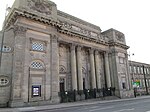Wedgwood Institute
1869 establishments in EnglandArchitecture in the United KingdomBuildings and structures in Stoke-on-TrentEngvarB from October 2013Former library buildings in England ... and 8 more
Gothic Revival architecture in StaffordshireGrade II* listed buildings in StaffordshireGrade II* listed library buildingsLibrary buildings completed in 1869Public libraries in StaffordshireStructures on the Heritage at Risk register in StaffordshireTerracottaVenetian Gothic architecture in the United Kingdom

The Wedgwood Institute is a large red-brick building that stands in Queen Street, in the town of Burslem, Stoke-on-Trent, Staffordshire, England. It is sometimes called the Wedgwood Memorial Institute, but it is not to be confused with the former Wedgwood Memorial College in Barlaston. It achieved listed building status (Grade II*) in 1972.
Excerpt from the Wikipedia article Wedgwood Institute (License: CC BY-SA 3.0, Authors, Images).Wedgwood Institute
Clayhanger Street, Stoke-on-Trent Longport
Geographical coordinates (GPS) Address External links Nearby Places Show on map
Geographical coordinates (GPS)
| Latitude | Longitude |
|---|---|
| N 53.0448 ° | E -2.1973 ° |
Address
Clayhanger Street
ST6 3EF Stoke-on-Trent, Longport
England, United Kingdom
Open on Google Maps









